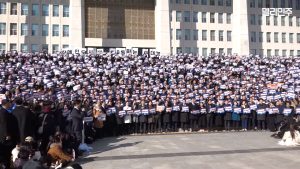Political turmoil erupted in South Korea after the announcement imposing martial law by President Yoon Suk-yeol on December 3, citing alleged anti-state activities and sympathy toward North Korea by the country’s main opposition party. The move sparked widespread uproar and backlash from lawmakers and citizens alike, as fear of South Korea’s authoritarian past and the hostilities of the previous martial law period of 1979-1981 reverberated in people’s hearts.
The move was reversed by the Cabinet after just six hours, following a vote in the National Assembly demanding that martial law be scrapped. Yoon accepted the vote and revoked the short-lived decree. Following this, major opposition parties proposed an impeachment motion against the president and his top aides and party members have also offered their resignations, showing their disapproval of Yoon’s decision.
Although this incident threw South Korea into political uncertainty and reminded citizens of their country’s painful authoritarian past, it also highlighted the remarkable resilience of South Korea’s democratic institutions. This event serves as a testament to the robustness of institutional frameworks that uphold democratic values in the midst of political turmoil. This valuable opportunity to analyze institutional response provides insights into how South Korea’s democracy has evolved to resist authoritarianism in contrast to the weaker historical response of these institutions during the previous martial law impositions.
Yoon’s People’s Power Party (PPP) had hoped to win a majority in the National Assembly in parliamentary elections in April. Instead, following a landslide defeat for the PPP, opposition parties, led by the Democratic Party, gained control of nearly two-thirds of the assembly seats. The outcome led to deadlock as Yoon failed to pass a budget proposal while the opposition, using its supersized majority in the parliament, repeatedly passed motions to impeach top prosecutors. Yoon has also been under pressure from the opposition to investigate his wife for allegedly receiving an expensive Dior bag as a gift from a pastor, which would violate South Korea’s strict laws on receiving gifts. On one hand, he was surrounded by allegations of corruption scandals while on the other hand, his government seemed paralyzed without a majority in the parliament. That appears to be why Yoon resorted to the drastic option of declaring martial law – a move unprecedented since South Korea’s transition to a democracy.
This marked the first time in 45 years that martial law was declared in South Korea, sparking serious public uproar in a strong democracy that ranks 22nd in the Economist Intelligence Unit’s 2023 democracy index. The memories of the previous martial law period from 1979-1981, following the assassination of President Park Chung-hee, and the brutal handling of public protests by dictator Chun Doo-hwan, leading to hundreds of fatalities, reverberated in the minds of Korean citizens, who earned their democracy through immense struggle and sacrifice.
However, this time around South Korea’s government institutions have shown robust resilience in controlling the president’s overreach and revoking the decree within six hours. Within hours of Yoon’s declaration of martial law, all 190 National Assembly members present at the middle-of-the-night emergency session unanimously voted to revoke it. The vote was a display of institutional checks and balances amid political turmoil, ensuring that no single leader can undermine constitutional principles. The judiciary reinforced the rule of law, standing as a potential barricade against arbitrary constitutional actions. Public protests further exhibited civil society’s role in holding the political leaders accountable, which has long been the hallmark of South Korea’s democratic spirit.
This resilience serves as a reminder of how South Korea’s democratic institutions, shaped through historical struggles, remain vigilant against authoritarian tendencies. Even in moments of crisis, the country’s commitment to democracy is unwavering. In a world where democratic backsliding is increasingly becoming a trend, South Korea’s experience demonstrates that strong, independent institutions are the cornerstone of safeguarding democracy, ensuring its resilience even in times of political turmoil.































